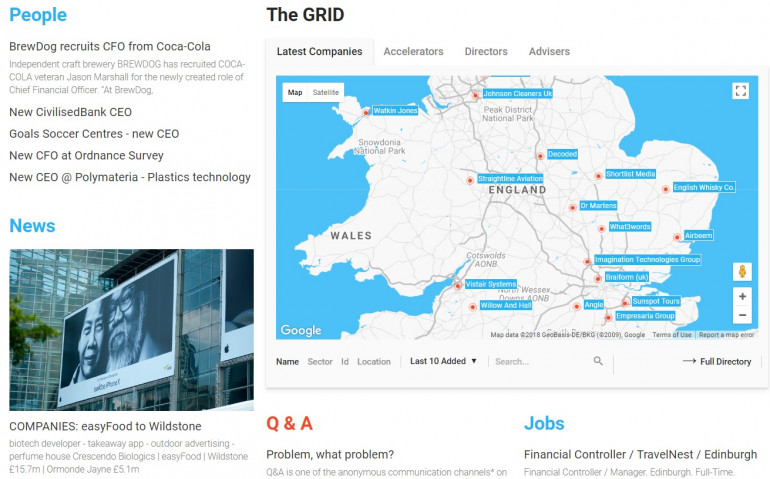Published by Directorzone Markets Ltd on July 18, 2016, 9:00 am in News, Other

News about 11 UK growth companies and/or accelerators + turnover in the GRID marketplace, 10th - 16th July 2016:
Clear Returns | Dryrobe £1m | Perkbox £4.3m | Transgressivex £2m | Hackett £110m | Gyana | Start Up Loans | Zeal Creative £1.8m | Revolut | WeSwap | Centtrip
Start-ups fear angels won’t invest after Brexit | Kiki Loizou, The Sunday Times. July 10 2016
CLEAR RETURNS
DZ profile:
Business: software development company
Launched: 2012
Location: Scotland
Founder: Vicky Brock, 44,
Staff: 17 staff from 11 countries, mostly European.
Investment: raised more than £600,000 from investors through the likes of Angels Den and Angel Academe, a network of women investors and mentors. Irish investors: more than £4m
DRYROBE
DZ profile:
Business: makes waterproof and windproof changing robes for sportsmen and women
Launched: 2010
Location: headquarters in Barnstaple, Devon as well as an office in New Jersey and a warehouse in Chicago
Founder: Gideon Bright, 49,
Staff: 6
Financials: This year predicts revenues of £1m
Investment: angel investor, Lara Morgan for about 30%. Her business Pacific Direct, which supplied the hotel industry with toiletries, was sold in 2008 for £20m.
PERKBOX: Keeping big companies’ staff happy brings its own rewards | Laura Onita, The Sunday Times
DZ profile:
Business: Huddlebuy Limited, trading as Perkbox - a site that lets employers reward their staff with food vouchers, cinema tickets and mobile phone insurance. Perkbox buys bulk deals at special rates from gyms, travel agents and high street retailers — and Chopra claims it is one of the biggest buyers of cinema tickets in Britain. These are given away or discounted, helping staff to stretch their earnings. Today among its 2,500 clients are businesses such as British Gas, Worldpay and Bupa, which pay a monthly fee for each of their employees to use the site. Workers have access to more than 200 perks, plus free counselling sessions and financial advice.
Location: City of London
Launched: 2015
Founders: Saurav Chopra, 38, and Chieu Cao. Chopra is ex Yahoo Mobile as head of business development for Europe. Left in 2006 to work with start-ups, helping to grow technology businesses Amobee and Bytemobile overseas; both were later sold, for $321m and $435m respectively.
Staff: have increased five-fold in 18 months
Financials: made profits of £177,000 on sales of £4.3m last year, and is aiming to triple revenues this year.
Investment: The two friends own 78% of the company. Had raised £350,000 from high-profile investors such as Zoopla founder Alex Chesterman and tech entrepreneur Sherry Coutu, a website offering deals on stationery and printing. Within months of starting up, they were haemorrhaging cash. After tweaking the model they came up with Perkbox.
News:
1. plans to expand on the Continent and in North America next year. But Brexit has put a spanner in the works. “It would be naive to say it is not affecting businesses,” said Chopra. “We had a couple of clients who were close to signing, but they’ve put it on hold because they might relocate staff. As a result we are focusing on markets like North America.”
2. When Perkbox launched, it initially targeted small and medium-sized businesses. “Traditional [employee benefits] providers had been focused on big corporates,” said Chopra, “and most made you sign a long-term contract and pay upfront.” Perkbox has a pay-as-you-go model instead, which Chopra believes has given him a competitive advantage.
3. UPDATE: Start-up Perkbox provides the perks for firms to keep their millennials motivated | Clare Hutchison, Evening Standard. December 19. Its original backers have reinvested and a fresh batch, recruited through a Seedrs crowdfunding campaign, has helped it raise another £4 million. Seedrs adviser and tennis champion Andy Murray was among them. The funds will fuel expansion and allow Perkbox to set up in the US. Chopra believes it can get to that £100 million mark in three years and potentially become a £1 billion-plus business. Staff: 115. Turnover: £14m (2016).
TRANSGRESSIVEX: Whiskey whiz Nadim Sadek is shaking up market research with TransgressiveX | Jamie Nimmo, Evening Standard. July 11
DZ profile:
Business: market research company. TX reveals to global corporations how consumers view them, whether they care about values such as aspiration or empathy, and what the companies should be doing differently. This helps them to tailor marketing or advertising campaigns. It enlists on average about 1600 people for its five-minute online surveys, and takes three to six weeks to collate the responses — much quicker than the usual eight to 12 weeks of traditional market research firms. Counts Unilever, Molson Coors and Saga as clients.
Launched: founded TX in 2012 but officially launched it last year after three years of testing
Location: Pavilion business members’ club in Kensington
Founder: Nadim Sadek, Irish-Egyptian entrepreneur and consumer psychologist.
Staff: dozen staff in South Africa running the software and a similar number in London, including Sarajit Mitra, recently hired from HSBC where he was global head of marketing.
Financials: expecting turnover to pass £2m this year.
News:
1. 13 years ago, he made a fortune selling his first business, Sadek Wynberg Research, to WPP’s Millward Brown 10 years after founding it.
2. Then he bought Inish Turk Beg, a 65-acre island off the west coast of Ireland. There, he ran a recording studio, which birthed an Irish number one album in The Brilliant Irish Flute. Featuring Alan Doherty and Shea Fitzgerald, it included a cover of Sex on Fire by the Kings of Leon. The private island was also a hospitality venue (Bono and Bill Gates were among Sadek’s guests). He also bred Connemara ponies, had a smoked fish range and held art residencies there. But the main business was the Inish Turk Beg whiskey brand, with its instantly recognisable tilted bottle and the tagline “Live life at a tilt”. His island dream ended when he had to sell up in 2013 for a knockdown £2.85 million, blaming “banks pulling out of the euro”. But he’s quick to point out that he still owns the rights to the whiskey brand.
3. Side projects that include music, his new YouTube channel Boss Bikes for motorbike enthusiasts, and setting up an academy for troubled teens with Nadia Sibany, a Cuban boxer who is his personal trainer. Manager for Shaefri, a young Irish female singer-songwriter whose manager he has been for the past five years.
HACKETT: dismisses Brexit blues with plans to break US market | Joanna Bourke, Evening Standard. July 12
DZ profile: Hackett Limited
Business: Upmarket menswear retailer and clothing brand. Has 124 stores and franchises around the world
Launched: 1979
Founder: Jeremy Hackett, Chairman and Ashley Lloyd-Jennings
Financials: sales of £110m in the year to March 31, 2015
Investment: In June 2005, Richemont sold Hackett Limited to the Spanish investment company Torreal S.C.R., S.A. In February 2015, Hackett London (part of the Pepe Jeans Group) has been bought by Lebanese M1 Group and by LVMH subsidiary: L Capital Asia. The company was previously owned by Torreal Funds (31 percent), Artá Capital (16.4 percent), L Capital Europe (11.5 percent) and its managers. Additional source Hackett profile on Wikipedia.
News:
1. expects to open its first standalone US store in the autumn, two years after first mooting the idea.
2. will also open department stores concessions in Essex and Newbury this year, and at One New Change in the City next month.
UPDATE: Hackett back in fashion as weak pound pulls in punters | Joanna Bourke, Evening Standard. January 9, 2017
The British label said a surge in tourists taking advantage of the weaker pound since the Brexit vote had led to greater spending in its central London stores. ...helped sales last month to show an increase from December 2015. ...saw UK and Ireland turnover fall 2.4% to £107.4m in the year to March 31, but global sales rose 5.8% to 175m (£151m).Hackett plunged into the red, posting a loss in the UK and Ireland of £8.4 million compared with a profit last year of £949,000 and it partly blamed the slide on investments in new stores. However, the chain, which has 113 shops and 55 concessions globally, vowed to keep expanding, with more overseas stores planned.
GYANA: Start-up senses mood through big data | Jonathan Moules, FT. July 10.
DZ profile:
Business: technology company that translates big data into more easily understood 3D images for a range of government and corporate clients, from estate agents to NASA. At the core is an app that taps into satellite technology to create images that highlight the different moods of pockets of the population, fitness heat-maps of neighbourhoods, trending topics, transport and weather. It has a sentiment index, so if a politician was giving a talk, for example, the system would show what people in the crowd were feeling through things like social media. Gyana could be used to research the impact of a gym or grocery store on levels of health, fitness and mood in a particular neighbourhood.
Location: Saïd Entrepreneurship Centre, Oxford
Founder: Joyeeta Das, engineering graduate, and her husband.
Staff: team of a dozen people from 11 countries, covering such diverse fields as physics, engineering and philosophy.
Investment: Her first £100,000 of investment came from a student friend in her class. The company is closing a $10m series-A funding round, having raised just over £1.2m in its seed round from two family funds, Almington Capital, in Chicago, and UK-based Quivira Capital.
News:
1. When she had her idea Ms Das was completing an MBA at Saïd Business School. Ms Das credits “the power of the university network” in helping her find staff for Gyana. Has had mentoring support from her former tutors, including Thomas Hellmann, Saïd’s entrepreneurship professor.
2. Ms Das, an Indian national, was able to remain in the UK to build the business thanks to an entrepreneur’s visa awarded by Saïd on the strength of her business plan.
3. Ms Das believes there is a significant market and that scale-up is essential before any competitors catch up. The company is targeting professional services companies, such as estate agents, architects and real estate developers, for which location-based data are valuable.
4. The biggest challenge has been articulating this broad and ambitious vision to investors, especially in the UK, according to Ms Das. She has found they are not altogether convinced by her grand vision and tend to prefer a small niche business plan, a five to seven-year exit under £500,000 and a quick go-to market. “Unlike [Silicon] Valley they are not that interested in unicorns or big plans,” she says. Ms Das admits it has been a struggle to find ways around this and believes she needs to find those investors who are willing to take more of a risk.
Demand for start-up loans expected to rebound after Brexit vote | Andrew Bounds, FT. July 11.
START UP LOANS
DZ profile: The Start-up Loans Company
Business: government lending agency. Start Up Loans has lent £220m to 38,000 businesses since it started. Initially recipients had to be under 24, but the age limit has been lifted. The default rate is high — 35 per cent of loans are in arrears. But the government has set a ceiling of 40 per cent since the scheme lends to riskier clients. The number had dipped since 2013 as the economy grew and more people found employment. After handing out 13,000 loans in 2013, it expected to write 10,000 and to lend almost £70m this year, before the referendum result. Customers range from a dog grooming parlour that now has a national franchise, to a brewery in Salford run by seven brothers. It lends via intermediaries around the country and administration costs account for about 18 per cent of turnover. ....30 delivery partners, including Sir Richard Branson’s Virgin StartUp, the Prince’s Trust and Transmit Start-Ups. ....receive a fee of 15% to 20% of the value of each loan. Its loans carry a 6 per cent interest rate and the sum is capped at £25,000 per person in the business, up to £75,000.
Launched: 2012
Staff: Tim Sawyer, chief executive
News:
1. Some 45 per cent of recipients of the subsidised loans were previously unemployed. “The people we lend to would not get credit elsewhere — or would be paying 20 per cent interest or more. Then they don’t have the cash spare to fund the business.”
2. It lends disproportionately to the young, women and ethnic minorities. Some 41 per cent of Start Up loans go to women, who found 25 per cent of businesses nationally. Some 25 per cent of loans go to ethnic minority entrepreneurs, who account for just 7 per cent of businesses.
3. Some 80 per cent of its clients have survived the first four years but it still lost £15m last year through defaults.
4. “Every pound we put into the local economy we are getting £3 back. The Treasury thinks that is good value. And that does not include the social impact or savings such as unemployment benefit not being paid. The return would be £5-6 if we counted that.”
5. Start Up Loans is funded until 2020. Mr Sawyer said his main challenge now is to find follow-on funding for companies.
UPDATE:
I wouldn’t have had a shot without the loan scheme | Kiki Loizou, The Sunday Times. October 30, 2016.
6. More than £70m of loans — almost a third of the total — have been written off or are in arrears. Ministers have said overall losses should not exceed 53%, a limit that has crept up from 40%. “We’re lending to people who can’t get bank loans,” said Tim Sawyer. Last year, more than 40% of borrowers were unemployed when they applied. Losing money was factored in to the plan, said Sawyer. “It’s a scheme right at the heart of what the government wants to do: get people back to work and help those who are ‘barely managing’,” he said.
7. The government wants to increase the number of loans granted from 40,000 to 75,000 by 2020. That will mean spending of between £75m and £90m over the next two years.
The Start Up Loans Company delivers over £300m to UK micro-businesses | Georgina Varley, City A.M. April 3, 2017
8. The Start Up Loans Company hits £300m lending milestone. More than 11000 new and early-stage companies are supported each year by the SULCo’s government-backed programme. As a result, over 55000 jobs have been created and more than 19000 formerly unemployed individuals have been given the means to launch their own businesses.
9. Matt Lovell and Rob Hampton, co-founders of seafood restaurant The Oystermen, secured the 46400th loan that drove the total aid provided past the £300m mark. The SULCo gave Lovell and Hampton £25000 each, which they used to pay their lease deposit and purchase kitchen appliances. Lovell and Hampton anticipate a 300 per cent turnover growth in the next 12 months for their company.
10. With the passing of the £300m milestone came the SULCo's announcement of its planned merger with the BRITISH BUSINESS BANK. The SULCo has worked closely with the British Business Bank since 2014. The move will help both organisations deliver the government’s manifesto commitment to support 75,000 micro-businesses by 2020.
ZEAL CREATIVE
DZ profile:
Business: marketing business which works for Kellogg’s, Nestlé and Castrol. One successful idea was giving away Google Cardboard virtual reality eye wear that, when combined with a smartphone, replicates a rally car drive.
Launched: 2014
Location: Salford Quays
Founders: Stewart Hilton and Robert White, in their early 40s,
Staff: 20. Have hired two apprentices as well as several graduates.
Financials: annual turnover of more than £1.8m and is doubling every year.
News: Stewart Hilton was working on his business plan in a coffee shop when he overheard a man discussing a Start Up loan. Two days later he and partner were applying for one.
Revolut looks to Brexit ‘opportunity’ | Nicholas Megaw, FT. July 12, 2016.
Investors back start-ups to disrupt travel money exchange market
REVOLUT
DZ profile: Revolut Ltd
Business: Digital challenger bank and British currency exchange app. The company’s app and payment card allows users to convert and spend money from more than 100 currencies at interbank rates, without charging a commission like traditional exchange services. The company processed $500m of transactions in its first 10 months after launching last July and said it was attracting about 1,500 users a day. Its app is linked to a pre-paid MasterCard which lets people add money from their domestic bank account and then spend in over 90 currencies around the world at the interbank rate, the best exchange rate available with no fees. Usually, FX brokers sell customers money below the interbank rate, making their money through fees and the difference they buy and sell at. But Revolut plans to use alternative revenue streams, such as marketing to consumers through its app. However, it did recently introduce a "fair usage" clauses that charge some fees above certain thresholds, such as a 2% levy on ATM withdrawals above £500 a month.
Founder: Born near Moscow, Nikolay Storonsky, 31, studied physics at the Moscow Institute of Physics and Technology and has a masters in economics from the New Economic School in Moscow, before joining Lehman Brothers’ trading floor in London in 2006. Two years later, Lehman went bust. After five years trading derivatives at CREDIT SUISSE, he left to set up Revolut — funded with his own money. A former state champion swimmer, he is now an avid kitesurfer.
Investment: Early seed investors include BALDERTON CAPITAL and INDEX VENTURES, Europe’s biggest venture capital firm. Has now raised up to £6.75m from investors. It will offer a further £1m in shares to the public through crowdfunding platform CROWDCUBE.
News:
1. 70% of Revolut customers come from the UK while the rest are in Europe. The majority of spending is in US, Storonsky says.
UPDATE:
Digital challenger bank Revolut raises $66m from Balderton, Index and Ribbit and will crowdfund more on Seedrs in latest fintech funding | Lynsey Barber, City A.M. July 10
2. more than 700,000 customers after two years ...has raised $66m (£51m) in a series B from existing investors and RIBBIT CAPITAL. ....towards expansion in Asia and North America and launch new products and services ...i.e. in recent months an Amazon Prime style subscription, banking for business and partnering with other fintechs for loans. And it's taking on Transferwise by scrapping fees on transfers of up to £5,000.
3. ...will target key markets in Europe, where it plans to hire new country managers, including Germany, France and Scandanavia. ...plans to launch personal IBAN accounts across the region so that users can pay their salaries into Revolut and will soon accept cryptocurrencies such as bitcoin and ethereum.
4. ....plans a fresh round of crowdfunding via SEEDRS to raise a further $5m after a hugely popular raise on Crowdcube which saw more than £17m pledged by 10,000 investors ...past the £1m target.
5. It also took on an undisclosed sum of debt financing from TRIPLEPOINT VENTURES in June
Revolut to launch commission-free share trading service | Martin Arnold, FT. June 7, 2018
6. ...has applied for a licence with the Financial Conduct Authority to act as a broker buying and selling shares itself....plans to launch a commission-free share trading service for its more than 2m users, positioning the start-up as one of the most aggressive digital challengers to British high street lenders.....will announce plans to offer a free service to trade in UK and US shares. ...it plans to launch the share trading service in the next four to six months in partnership with an established brokerage, shouldering the cost of commissions it pays on behalf of its users. It plans to expand the service to European shares after it is launched.
7. The move mimics the fast-growing service already offered by ROBINHOOD to more than 4m people in the US. Robinhood, which has some investors in common with Revolut, including Index Ventures and Ribbit, was recently valued at $5.6bn in its latest fundraising and has diversified into trading options and cryptocurrencies.
8. In April, Revolut announced a $250m fundraising - led by Russian venture capitalist Yuri Milner’s (Russia’s most influential tech investor) DST GLOBAL - which valued the company at $1.7bn, more than five times the level of its last round of investment in 2017. Earlier this year it said it had broken even on a monthly basis. The company plans to launch its pre-paid cards service in the US in August or September.
9. It recently grew to more than 2m customers, double the level of six months ago, of which about half are based in the UK and half in the rest of Europe.
Interview: Nikolay Storonsky says Revolut will be the Uber of banking | Rosamund Urwin, The Sunday Times. June 17 2018
10. Revolut will be five times the size of any bank, boasts its founder Nikolay Storonsky. When Revolut launched three years ago, it was a pre-paid card and an app that allowed travellers to switch cheaply between pounds, dollars and euros. Now, its more than 2m users can buy travel insurance and five cryptocurrencies, and have what amounts to a current account (though it only supports direct debits for its Euro accounts — it does not yet have a UK banking licence). It has branched into wealth management and will launch a commission-free share trading platform later this year. With share trading, it can lend out the stock.
11. Canary Wharf skyscraper HQ. It has been based in the Level39 start-up accelerator since launch.
12. ...will launch in the US and Australia this summer, then Singapore, Hong Kong and New Zealand. This will mean customers can, in effect, have bank accounts in different countries.
13. The business, which has 400 staff worldwide, is applying for a banking licence in Lithuania and, because of Brexit, in the UK. Its 100 staff in London hail from more than 60 countries. Running Revolut gives a window on consumer behaviour. ...about to launch a new budgeting tool to help stop users over-spending. It is also working on a gambling project to help addicts.
Rattled Revolut seeks help from funds grandee Martin Gilbert | Emma Dunkley, The Sunday Times. March 10 2019
14. …has hired veteran fund manager Martin Gilbert and joint chief executive of Standard Life Aberdeen as an adviser after a botched systems upgrade last year and amid accusations that it has a “toxic” work culture.Storonsky has also been forced to defend Revolut against allegations in Wired magazine that prospective employees were pressured to do unpaid work and punishingly long hours. Customer service has come under the spotlight too. Storonsky admitted in an open letter last year that Revolut’s services had “been a little up and down”, blaming its rapid growth.
15. ...has amassed more than 4m customers across Europe. Revolut has raised about $340m (£260m) of venture capital to date and is aiming to roll out its business in the US, Australia and Singapore. It became the first UK fintech unicorn last April after it was valued at $1.7bn.
WESWAP
DZ profile: Weswap.com Limited
Business: British currency exchange app and peer-to-peer travel money service: facilitates peer-to-peer swaps whereby customers with different currencies exchange directly with each other. It claims to charge a rate 1%, compared to the 13% typically charged by competitors. The service now has customers across 10 countries and supports 18 different currencies.
Launched: 2013
Founders: Jared Jesner, chief executive, and ex-corporate finance adviser Simon Sacerdoti
Investment: $7.5m Series A in October 2014, which saw WeSwap broaden its user base through travel industry partnerships. Has just secured $10m in Series B funding from ASCOT CAPITAL PARTNERS, EC1 CAPITAL, and IW CAPITAL.
UPDATE:
This currency swapping startup could cut the cost of going abroad | Katherine Denham, City A.M. October 5, 2017.
1. The concept for WeSwap emerged during Jesner’s time working for oil giant Shell, when he travelled constantly between the head offices in London and the Hague. “I’d see my colleagues at the currency exchange desk in the airport – so I thought: what if we swapped currency with each other without being ripped off?”
2. While millions of fintech firms are competing to try to disrupt the banking sector, WeSwap has arguably been bolstered by its position in the travel industry, having now formed partnerships with various travel businesses and airlines, such as SKYSCANNER and HOTELS.COM, which now distribute the product.
3. The startup has ploughed through various financing paths in its six-year lifespan. From getting angel investors on board, to smashing its £1m target in an oversubscribed crowdfunding campaign, the firm has now launched a series B funding round through private equity house, IW Capital, in which it hopes to raise £8m.
4. Jesner thinks that early stage companies should be picky about choosing venture capitalists (VCs) to back their firm, and he says it’s important to opt for investors who are patient. “It takes time for startups to find their feet, and they need constant support during the early stages.” He points out that many VCs would drop a firm if it failed to meet its first year plan, which is potentially catastrophic for the company because it could mean no one else will want to invest going forward. “When you’re right at the beginning and you make a plan, you have no idea if that plan is reasonable or not.” He explains that this is where the IW Capital team has helped, assessing the plan, its progress, and whether more investment is needed.
5. But it’s also about having simple deal structures in place – which Jesner says is pretty hard to come by in the VC universe. “These complex clauses can lead to problems later on and can mean the founders don’t make as much money as they should, while the VCs might double their money.” And ultimately it’s crucial that businesses to have the right mix of finance at the right stages. “Getting big VC investors in too early can lead to failure; it’s not good early on, but it’s really helpful later.”
6. His devotion for WeSwap was put to the test a few years ago when someone wanted to buy him out. At the time, Jesner – who has three children – had no money, and was borrowing from his grandmother to pay the bills. “It made no sense at that point to continue with the business, but I pulled out of the deal because I realised it was more about a love for the business than a big cheque.”
7. Jesner’s unrelenting belief in his idea has driven WeSwap forward, and since its full launch two years ago, 320,000 customers have exchanged a total of £100m. It also made more revenue in the first quarter of this year than in the whole of 2015.
CENTTRIP
DZ profile: Centtrip Limited
Business: global payment platform and prepaid "spread-free" travel money card that offers customers foreign currency at the market exchange rate. The rate that Centtrip pays to buy the currency is the rate that the customer pays. Centtrip's prepaid Mastercard was launched at the end of 2014. It is thought to be Britain's first spread-free prepaid card and is marketed at frequent business travellers who load large sums on to the card. This is why the maximum balance permitted on a Centtrip card is £100,000 whereas most prepaid currency cards allow only around £5,000. Centtrip provides customers with access to the live market and real foreign exchange rates with 0% spread or commission through one multi-currency account. Customers pay a maximum of 0.5% to load money to their account and can deposit and hold funds in 14 currencies and send payments worldwide in all major and most ‘exotic’ currencies. Centtrip now has over 5,000 clients across a range of business sectors including luxury yachting, professional services and the music and sports industries. Centtrip Card Limited (Company No. 08651138)
Launched: 2014
Founders: Tony North, Brian Jamieson and Daniel Butcher who previously founded Schneider Foreign Exchange and HiFX, foreign exchange businesses that were recently sold for a combined £350m.
Staff: Eric Nicoli, Chairman. Former Chairman and CEO of EMI Group plc and Group Chief Executive of United Biscuits plc, and one of a number of high profile early investors in the company








